 In our recent webinar, Kim Samano, Ph.D., Postdoctoral Fellow at Quest Diagnostics, discussed the pharmacological profiles and physiological effects of synthetic cannabinoids (SBCs) and designer stimulants known as “Bath Salts.” She explained the evolution of chemicals that help drug manufacturers to stay ahead of detection and the misperception of safety for these drugs that are often easily purchased and commonly referred to as a “legal high.”
In our recent webinar, Kim Samano, Ph.D., Postdoctoral Fellow at Quest Diagnostics, discussed the pharmacological profiles and physiological effects of synthetic cannabinoids (SBCs) and designer stimulants known as “Bath Salts.” She explained the evolution of chemicals that help drug manufacturers to stay ahead of detection and the misperception of safety for these drugs that are often easily purchased and commonly referred to as a “legal high.”
She answered several of our participant’s questions during the presentation. Here are some commonly asked questions about synthetic drugs.
Are synthetic drugs and the substances found in these products legal?
The vast majority of states have banned synthetic cannabinoids and synthetic cathinones by adding individual substances to their controlled substances schedules. A special report by the National Forensic Laboratory Information System (NFLIS) helps to show the differences between the state laws. Yet, only a limited number of substances are listed as Schedule I drugs of the Controlled Substances Act.
Are synthetic cannabinoids the same as marijuana?
No, synthetic cannabinoids are not marijuana. Although these compounds mimic the effects of THC, synthetic cannabinoids produce more intense responses with smaller amounts of the drug. Studies show that some SBC users report taking synthetic cannabinoids to avoid a positive drug test result and return to using marijuana between drug tests. Like many other drugs of abuse, repetitive users of these drugs may need to ingest increasing quantities of the drug to achieve the same euphoric effects.
Are all synthetic cannabinoids products, such K2 or spice, the same?
No. The product components of synthetic cannabinoids vary from one product to another, despite a similar appearance in “potpourri-like” ingredients and colorful packaging. All synthetic cannabinoids are labeled “Not for Human Consumption” to evade FDA regulatory requirements.
What health effects do people experience after taking “Bath Salts”?
Although the media can sensationalize the delirium associated with this type of drug, bath salts may induce unpredictable and sometimes severe physical effects lasting minutes or even hours. The term “Bath Salt” refers to many different compounds of amphetamine-like stimulants. The drugs produce an excessive release of dopamine and have a high potential for addiction.
How should an employer include synthetic drugs in their drug testing program?
Over the last few years, synthetic drug use has expanded among young adults. Concerned employers should include a provision in their drug testing policy specifically prohibiting the use and/or possession of synthetic drugs while on company property, similar to policies regarding alcohol and illicit drugs. Employers should consult an attorney who is licensed to practice in their state to help develop their policy. Finally, a decision to monitor synthetic drugs in workplace drug testing should take into account user demographics, regional patterns of drug use and testing benefits and limitations.
Download our Synthetic Drugs FAQ for more answers to your questions.
Watch a recording of this webinar or other webinars presented by Quest Diagnostics.
For more information about drug testing, visit our website.


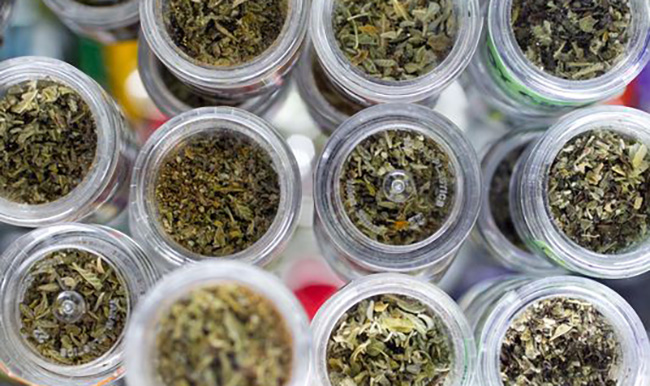




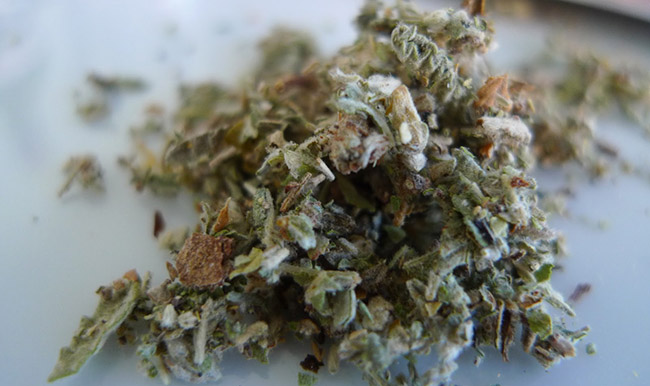

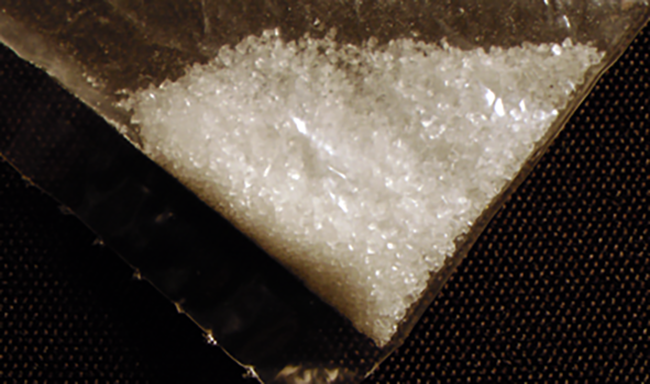
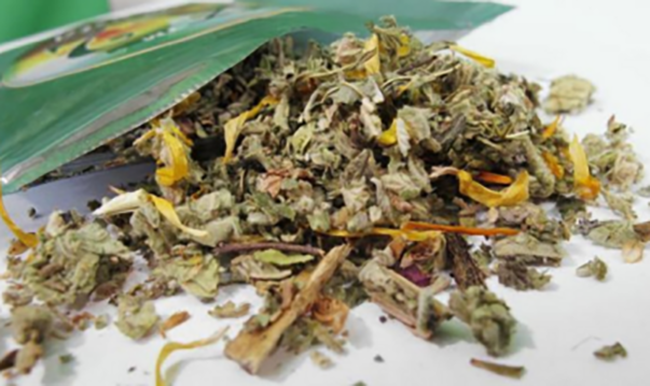
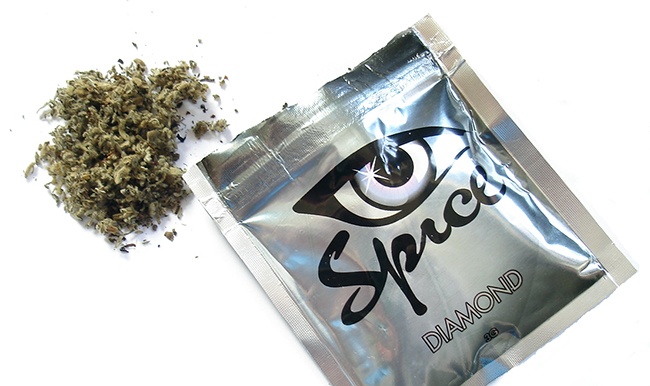
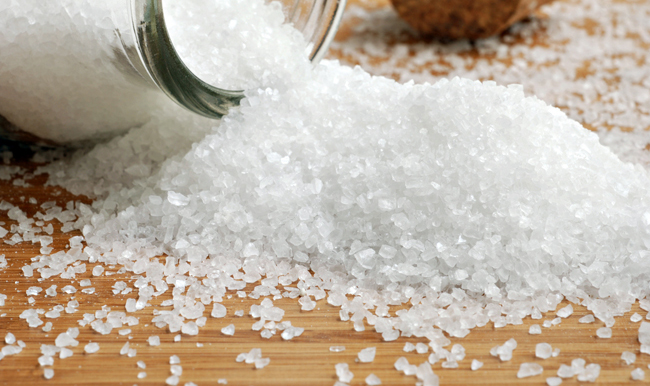
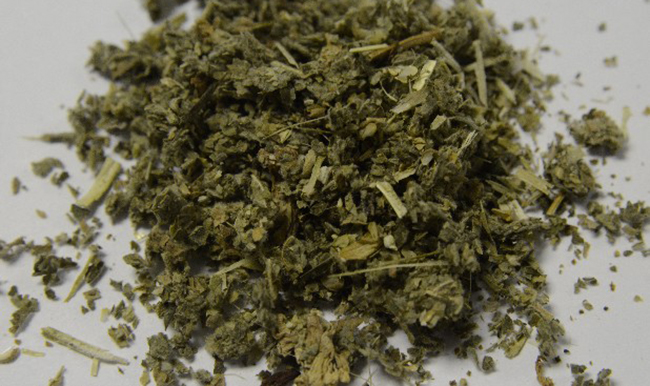
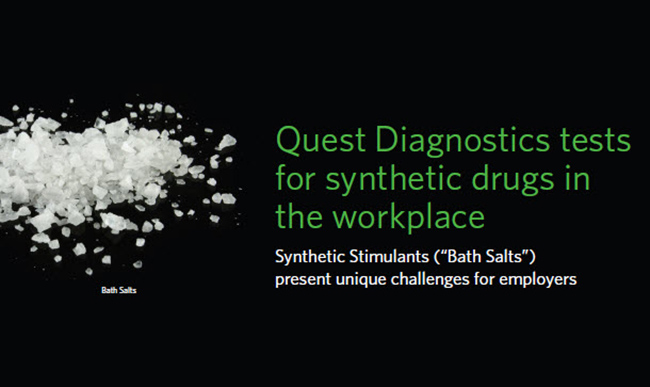




She answered several of our participant’s questions during the presentation. Here are some commonly asked questions about synthetic drugs.
Are synthetic drugs and the substances found in these products legal?
The vast majority of states have banned synthetic cannabinoids and synthetic cathinones by adding individual substances to their controlled substances schedules. A special report by the National Forensic Laboratory Information System (NFLIS) helps to show the differences between the state laws. Yet, only a limited number of substances are listed as Schedule I drugs of the Controlled Substances Act.
Are synthetic cannabinoids the same as marijuana?
No, synthetic cannabinoids are not marijuana. Although these compounds mimic the effects of THC, synthetic cannabinoids produce more intense responses with smaller amounts of the drug. Studies show that some SBC users report taking synthetic cannabinoids to avoid a positive drug test result and return to using marijuana between drug tests. Like many other drugs of abuse, repetitive users of these drugs may need to ingest increasing quantities of the drug to achieve the same euphoric effects.
Are all synthetic cannabinoids products, such K2 or spice, the same?
No. The product components of synthetic cannabinoids vary from one product to another, despite a similar appearance in “potpourri-like” ingredients and colorful packaging. All synthetic cannabinoids are labeled “Not for Human Consumption” to evade FDA regulatory requirements.
What health effects do people experience after taking “Bath Salts”?
Although the media can sensationalize the delirium associated with this type of drug, bath salts may induce unpredictable and sometimes severe physical effects lasting minutes or even hours. The term “Bath Salt” refers to many different compounds of amphetamine-like stimulants. The drugs produce an excessive release of dopamine and have a high potential for addiction.
How should an employer include synthetic drugs in their drug testing program?
Over the last few years, synthetic drug use has expanded among young adults. Concerned employers should include a provision in their drug testing policy specifically prohibiting the use and/or possession of synthetic drugs while on company property, similar to policies regarding alcohol and illicit drugs. Employers should consult an attorney who is licensed to practice in their state to help develop their policy. Finally, a decision to monitor synthetic drugs in workplace drug testing should take into account user demographics, regional patterns of drug use and testing benefits and limitations.
Download our Synthetic Drugs FAQ for more answers to your questions.
Watch a recording of this webinar or other webinars presented by Quest Diagnostics.
For more information about drug testing, visit our website.